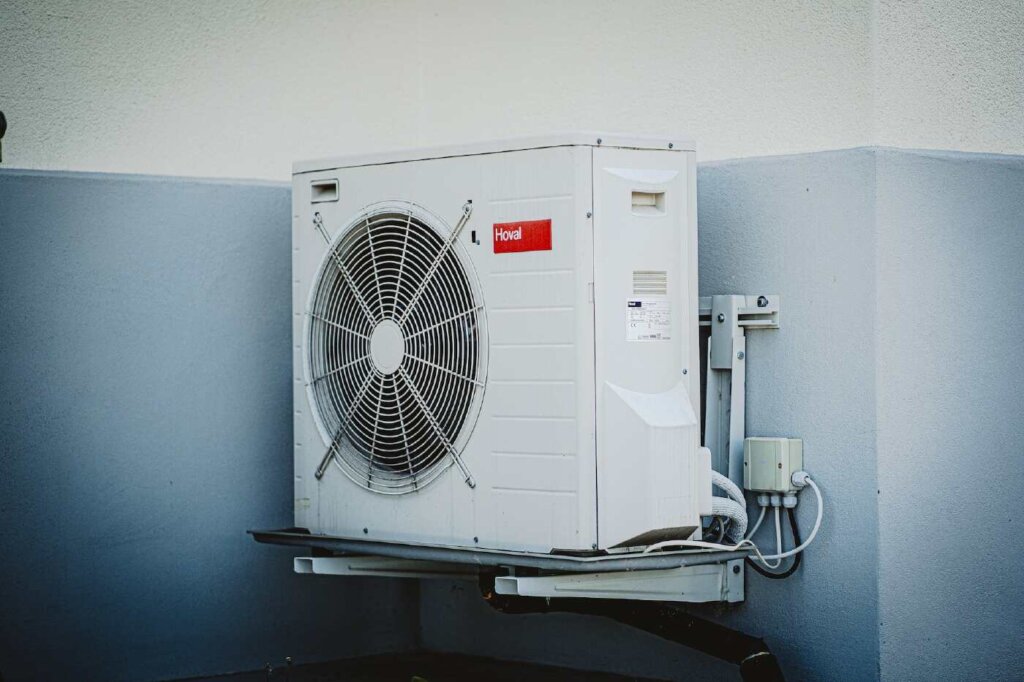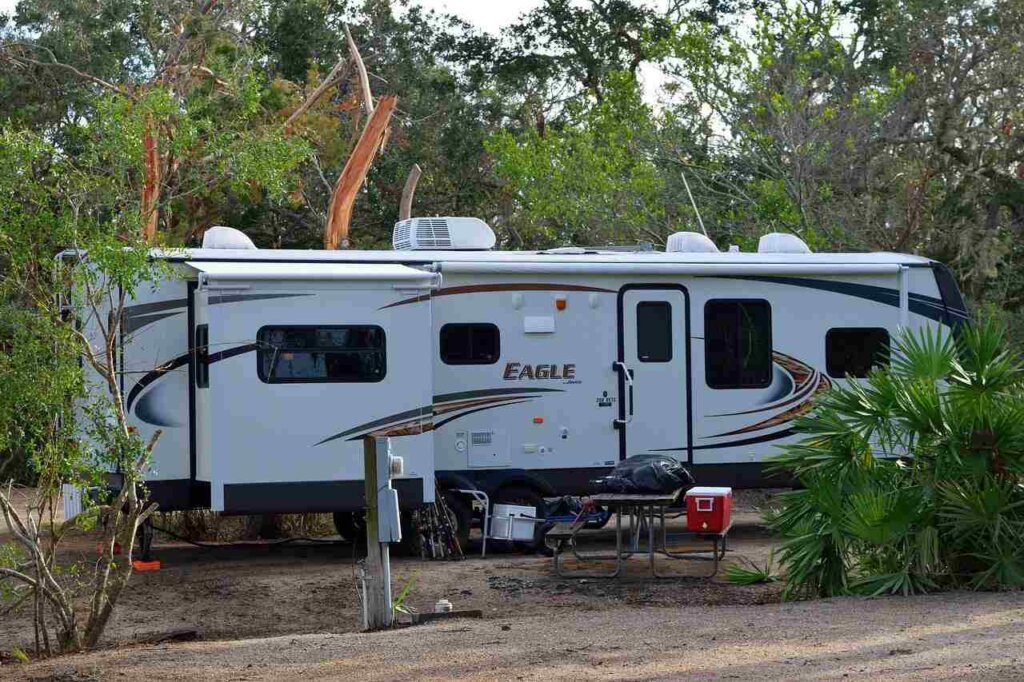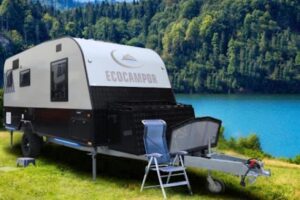Luckily, the advent of the RV air conditioner has brought sweet relief to the tens of thousands of Americans who hit the road each summer to explore our country’s National Parks, Forests, and Recreation Areas.
While there are many ways to keep a camper cool in hot weather, nothing beats an RV AC unit in its ability to cool down a rig.
How Long Can You Run an RV Air Conditioner?
To put it simply, an RV air conditioner can run for as long as it is connected to a source of power.
If your camper is connected to residential shore power or an RV park power hookup, your AC will have no problem running all day and night. The same holds true if your source of power is a generator. As long as there is enough fuel to keep the generator running, your AC will keep running too.
Now, is it a good idea to try to run your AC non-stop for 7 days straight? Maybe not. Most appliances, regardless of whether they are installed in an RV or a residential home, should be given an occasional break to cool down and in some cases, run shut-down and power-up sequences.
The trick with an RV air conditioner is to adjust the thermostat so the compressor contained in the unit has a chance to cycle on and off. This cycling action helps the appliance to run effectively and aids in preventing unwanted moisture and potential ice particle build-up.

50 amp vs 30 amp Connection
Most RV campgrounds offer two types of shore power connections: 50 amp and 30 amp. Some also offer power hookups with a 20 amp output, but it’s not common these days.
If you are driving a Class B motorhome or hauling a medium-sized adventure trailer, you will most likely be hooking up to the 30 amp shore power. These rigs typically only have one AC unit and thus don’t require as hefty of a power connection as big rigs with two air conditioners and other power-hungry appliances.
Large Class A motorhomes and fifth-wheel travel trailers are set up with 50 amp output power hookups. Most campers of this size have two air conditioners, multiple ventilation fans, and a whole host of other appliances requiring power. In order to meet the energy demands of all of these appliances, the power connection needs the capacity to provide more wattage at any given moment. 50 amp shore power can provide this wattage.
Make sure to verify what type of power supply your camper needs before plugging it in. There have been incidents where RVers hook up to the wrong type of power and blow their electrical system, resulting in thousands of dollars worth of damage. Not fun.
Boondocking
Some of you may be wondering how long you can run an RV air conditioner while boondocking.
For those who don’t know, boondocking is simply the act of camping in an RV in a location that doesn’t have access to power connections, water hookups, or waste dump stations. Boondocking campsites can look like pull-offs on the side of an empty highway, dispersed campsites deep in the wilderness, or even just a business parking lot.
Generators
All RVers should have a generator in their arsenal of RV equipment. A good power generator and several canisters of fuel can provide many hours of usable electricity for a camper while boondocking or in the event of a power emergency at a campground.
While connected to a generator, your RV’s air conditioner will be able to run for as long as the generator has fuel. This is great news, because generators are actually fairly fuel efficient and can run for many hours without consuming more than a couple of gallons of fuel. Be careful though, if your motorhome has a built-in generator, it is likely going to be drawing diesel from your camper’s main fuel tank. Run that generator too long, and you might drain your tank.
Those of you without built-in generators will need to purchase a portable gas generator and several portable gas canisters if you want to run your AC while boondocking. Portable gas generators are not too expensive and can be purchased at almost any hardware or home improvement store.
Etiquette tip: While camping near other boondockers, it is courteous to shut generators down in between the hours of 11 pm and 6 am. These are similar to the quiet hours that can be expected at most RV parks. But, if you do end up boondocking near a rig that has its generator on all night, the burden falls on you to move to a quieter site. It is considered rude to ask a boondocker to shut their generator off.
It is also considered rude to run a generator while boondocking in a business parking lot.

Running an Air Conditioner Using Battery Power
Batteries are not the best route for running your RV air conditioner. This is simply because ACs require a tremendous amount of energy, and most RV battery banks do not have the capacity to store that kind of power. See how solar power can help you here.
While it’s true that you can run an air conditioner using the energy stored in RV batteries, it would likely only run for 30 minutes to an hour before fully draining your system. That amount of time wouldn’t make much of a dent on the temperature inside your rig.
Even if a camper has eight, fully charged 100 amp-hour lithium batteries, they will only be able to keep an RV AC unit on for upwards of 4 hours. This isn’t a super feasible scenario for a number of reasons, the first and foremost being that a battery bank like that would cost upwards of $15,000 for the batteries alone. In my time as an RV technician, the most lithium batteries I’ve seen installed in one camper was five.
Air Conditioner Maintenance
Regular cleaning and maintenance goes a long way in keeping the efficiency of your AC up.
Check the filters of your AC unit regularly and give them a clean when you begin to see excessive dirt and debris build-up. Eventually all filters will need to be replaced. Consider buying a couple of back up filters and storing them somewhere in the camper so you have them on hand wherever you travel.
Condenser coils also need regular cleaning, as they are prone to build up of grime and dirt. With the unit turned off, use a soft-bristled brush to first wipe any excess dirt and debris off the coils. Then, using an aerosol coil-cleaner, lightly spray the coils. Let the solution sit on the coils for several minutes, before using a spray bottle full of clean water to rinse the coils clean.
One way to perform preventative maintenance for your AC is to keep the windows and doors of your camper closed while you run the appliance. This will prevent the unit from needing to over-work in order to keep your camper cool. Overworking an air conditioner will shorten its lifespan, and result in needing to dish out cash for a replacement sooner than necessary.
Frequently Asked Questions
Check out what other RVers are asking about their air conditioners.
Can an RV air conditioner overheat?
It’s not incredibly common for an RV’s AC unit to overheat but it can happen. This is primarily caused by dirty coils and air filters. Avoid overheating by staying on top of your AC’s maintenance.
How much does an RV air conditioner cost?
Depending upon the make and model of the unit, an RV air conditioner will typically put you between $700-$1800.
Will I need an inverter to run an RV air conditioner?
If you are powering an AC unit using batteries, you will need an inverter to convert the 12V DC power supplied by the batteries into the 120V AC (alternating current) necessary for the AC.
Have fun exploring and adventuring outside this summer! Remember that while it’s nice to have a cool and comfortable camper to take refuge in, the purpose of camping is to get outside and play! Don’t let the comforts of your rig keep you from enjoying all that Mother Nature has to offer.
Hot weather can be dangerous, so stay hydrated and make sure your kids and pets are doing the same.
If you are new to the world of RVing and want some tips on how to stay warm while camping this winter, poke around the Ecocampor blog. There you can find some great articles full of tips on staying toasty in cold weather.
Happy Camping!



